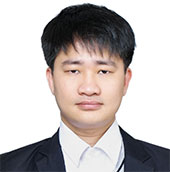 Dr. Thướng Nguyễn Cảnh
Dr. Thướng Nguyễn Cảnh
We approached Dr. Cảnh with a few questions:
Q. Please provide a brief background about yourself.
After that, I moved to South Korea and received my M.S. and Ph.D. degrees in computational photography and video coding from Sungkyunkwan University, South Korea, in 2014 and 2019, respectively. Next, I was a post-doctoral fellow at the Institute for Datability Science, Osaka University, for one year on computational imaging. Currently, I work at the Tencent Medial Lab as a Senior Researcher in video coding. Tencent Media Lab is dedicated to advanced research in audio and video communications technology, computer vision, and artificial intelligence.
Q. How does your work affect society?
In recent decades, we have given up our visual privacy in exchange for security and convenience (i.e., enabling higher accuracy in security surveillance and utilities). With virtual and augmented reality, there will be more and more cameras in our work and personal environments. Also, artificial intelligence has advanced accuracy in many computer vision tasks thus raising the big concern about visual privacy. In computational photography, I focus on a visual privacy imaging system based on deep learning and compressive sensing. A secure imaging system can maintain the accuracy of computer vision tasks without knowing the identity of subjects. This technique provides strong visual privacy protection at the sensor-level, thus potentially speed up the acceptance rate for smart vision-based technologies. In my work on video coding at Tencent Media Lab, my colleges and I implement and develop future video coding standards including MPEG Versatile Video Coding (H.266/VVC) and AOMedia Video 1(AV1). These advanced video compression technologies can deliver higher video quality and a better video conference experience at the same bandwidth. This is a major technology to improve the current work from home situation.
Q. How your work is related to signal processing?
All of my work is related to signal processing as I am working to improve technologies dealing with image and video signals. All of my papers have been published in conferences and journals in signal processing society.
Q. How has your involvement with the IEEE SPS helped you in building your career?
My first conference was the IEEE International Conference on Multimedia and Expo (ICME). It gave me a chance to meet world-class researchers with many great papers, ideas, and research. I enjoyed the experience so much that I decided to pursue a Ph.D. degree to continue attending more interesting conferences. I regularly join the International Conference on Image Processing (ICIP) conference and have made many new friends and connections that I am still in touch with. However, I only realized the importance of networking after jointing the young professional event in ICIP 2015 and later in 2018. I found those events very helpful for any young professionals in the signal processing community whether their intention was to go for academia or industry. With my desire to help other young researchers, after ICIP 2018, I decided to join the IEEE Young Professionals in Signal Processing and got involved in organizing the Young Professionals events in ICIP 2019 and ICASSP 2020. Besides having an amazing experience, volunteering with the IEEE Signal Processing Society has strengthened my connections with new colleagues. Normally, it is more challenging for international researchers to get a job in the USA from outside countries. The connections that I have made via the Young Professionals community helped me to first take a post-doctoral position and then find a job in the USA. I received many job opportunities from several US-based companies and jointed Tencent America.
Q. Anything else that you would like to add?
I would further emphasize the importance of networking. I would encourage young researchers to attend conferences regularly to build up their professional networks, and also joint social events like YP events to get help towards advancing their carrier.

 Dr. Thướng Nguyễn Cảnh
Dr. Thướng Nguyễn Cảnh
 Dr. Thướng Nguyễn Cảnh
Dr. Thướng Nguyễn Cảnh